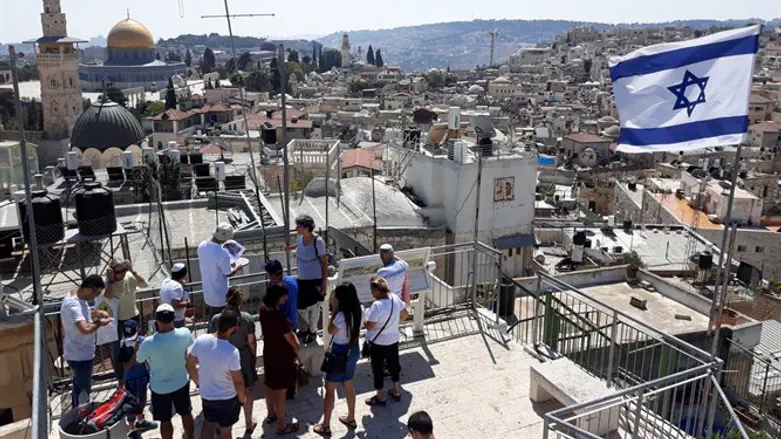
Click here to donate to Ateret Cohanim
Chairman of the Ateret Cohanim organization Mati Dan tells Arutz Sheva of the day-to-day struggle for the redemption of Jerusalem, without government funding, in the face of wealthy international actors who invest a great deal of money in halting moves to restore the Jewish character of Jerusalem.
In this context, Mati Dan mentions both the Turks and the Qataris as some of the actors that are pouring huge sums into the struggle for Jerusalem. "We still have to invest effort in every stone," he says, recalling the attack on the Jewish restoration of the Tiferet Israel synagogue, an attack in which Arab officials expressed concern about what they characterized as a change in the character of Jerusalem.
“They are fighting and we have to fight for every meter, they bring money from everywhere, from Qatar and from other places, but our state cannot make a decision in the present era," he says, adding that in such a reality, the activity to restore Jerusalem to its previous state is returning to the people. "This is what is beautiful in this campaign that strengthens us."
It should be noted that the only budget allocated to projects in the Old City focuses on security, but not on the redemption of buildings and real estate or the encouragement of settlement in the city, except for the case of the Yemenite synagogue in Kfar Shiloah, in which Minister of Jerusalem Affairs Zeev Elkin and Culture Minister Miri Regev decided to invest a sum of close to NIS 5 million for its rehabilitation and development as a heritage site.
Dan points to the preservation by an Arab of the synagogue where the Ateret Yerushalayim Yeshiva currently exists, formally the site of Yeshivat Torat Chaim, as the beginning of Jewish resettlement in the area. At its height, 300 students learned in Yeshivat Torat Chaim, and such notable Rabbinic leaders as Ha-Rav Tzvi Yehuda Kook, Ha-Rav Tzvi Pesach Frank, Jerusalem's Chief Rabbi and Ha-Rav Aryeh Levin.
The Yeshiva was badly damaged in the Arab riots of the 1920s and 30s before relocating to the new city of Jerusalem.
The Arab man took it upon himself to safeguard the building, its Torah Ark, bima, memorial plaques and library of approximately 3,000 books. The yeshiva was thus saved. It was the only one of some 80 synagogues and yeshivot which was not destroyed by the Jordanians.
Click here to donate to Ateret Cohanim
Immediately after the reunification of the city, the "Agudat Lochamei Yerushalayim" (Union of Fighters of Jerusalem) began to pray in the Yeshiva on Shabbat and holidays. Yeshivat Ateret Yerushalayim began to use the building in 5743 (1983).
The Arab man who safeguarded the place during the entire period of the Arab riots and the Jordanian government was asked why he did so and answered, "More than I guarded the yeshiva, the yeshiva guarded me." It turns out that the wife of that Arab told him that if he destroyed the synagogue, she would leave him. This threat worked and the place was preserved.
"From the place where Rabbi Tzvi Yehuda, Rabbi Elyashiv, Rabbi Frank and other great Jewish people learned, everything began, until the large settlement of dozens of families. More than eighty outside the Jewish quarter, some 1,000 people, in the City of David approaching 100 families, as well as in Maale Zeitim and Kidmat Zion and Kfar Hateimanim.”
"After the [Arab riots] of 1939, thousands of Jews left the Old City," says Mati Dan, who emphasized that "until then there was a Jewish majority in the Old City. From 20,000 Jews remained two thousand. The Rebbetzin Avitzedek at the time told all the owners of the properties forced to leave to rent their properties to Arabs, because one day we would return and would not have documents to prove it is ours. It was wise advice, and what is interesting is that everyone took it and the entire Jewish community rented properties to the Arabs.”
Later, when the Jordanian archive was seized, it was possible to obtain the properties by proof of ownership.
Mati Dan stresses that "aside from the money, we need to pray, to have God help us. We are emissaries of the people of Israel.” He describes the considerable security difficulties experienced by the families living in the area: "These are families that have undergone 7,000 security incidents since Operation Protective Edge. Vehicles carrying families have caught fire - scarry. It happens dozens of meters from the Western Wall. All this is just so we will not return to Jerusalem. "
"We are talking about a core of families who are sacrificing their lives every day and every hour, it’s amazing. It's fun to work to strengthen them," he says, recalling the evictions of Arab families who invaded the holy sites, evictions carried out under court orders and backed by law enforcement agencies, but naturally not well-received by the neighbors.
"There is not a cent from the state, not the settlement division, not the KKL. We receive only security from the Ministry of Construction, but the whole issue of building and bringing families is a project that comes down to the Jewish people itself, and at the same time we must constantly pray for divine assistance."
Click here to donate to Ateret Cohanim
